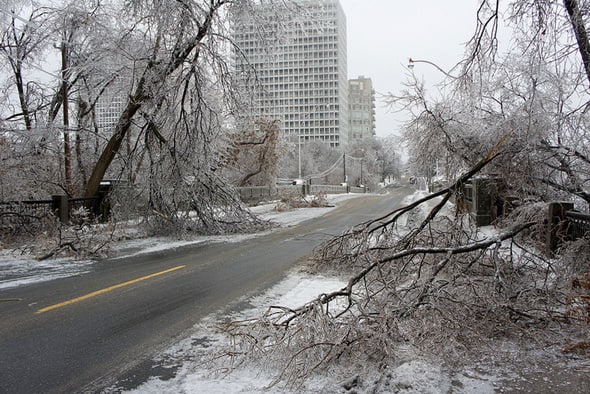
The Toronto ice storm has renewed interest in underground power lines. But would the costly solution really be better for the city?It’s a natural observation and one that surfaces every time weather batters overland power lines.
In Montreal in 1998, in Seattle two years ago and right now in Toronto, tens of thousands of people are dealing with a familiar problem. With ice building up, weighing on and ultimately pulling down power lines, many playing cards in a warming centre or huddled around a neighbour’s wood stove will be asking an oft-repeated question: why don’t we just put power lines underground?
The answer, as you might expect, comes down to money. Burying power lines, a process called “undergrounding” is expensive. Very expensive. A recent report from The Public Service Commission of Wisconsin estimated that the cost for building underground transmission lines was four to fourteen times as expensive as overhead lines. But this will be made up by a longer life cycle for underground lines right? After all, they are not exposed to wind, ice or freezing rain…
Turns out the jury is out on that. It’s true that underground lines, aside from the obvious aesthetic improvement, do offer a number of advantages and do generally last longer than above ground power lines. But it’s also true that they face a whole set of problems of their own, including wayward tree roots, flooding and the frustrating and expensive process of locating and repairing faults along the line.
Despite these challenges, some municipalities have gone ahead with underground lines. Winter Park, a suburb of Orlando, is currently undergoing a transformation that will take nearly two decades to complete. As of last year, the town had buried 79 miles of electrical cables, mostly along major thoroughfares. If residents want to get rid of power lines on their street faster, the city has a “plug-in program,” that allows residents to share the cost of burying the wires on their street with the city. But the city’s utility director says this isn’t a very popular option.
San Diego is even further along, having started burying residential lines in 1970. In 2003, that city approved a surcharge to resident’s electric bills that funds the burial of about 25 miles of utility lines each year, at an annual cost of more than $50-million.
Winter Park and San Diego of course, aren’t Toronto. Hundreds of thousands of people losing their power in Ontario is a serious public safety concern, and a massive drain on resources. Toronto Hydro CEO Anthony Haines says it will cost about a million dollars a day to reconnect the approximately 215,000 Torontonians who are still without power. But is that enough to send city councilors scrambling for solutions that could prevent this from happening again? That’s an unlikely scenario.
The bottom line is that Torontonians are probably like Seattleites or Montrealers when it comes to power lines. Sure the ice storm is a pain, but it’s a temporary pain that is fast forgotten. Thomas Schooley, a Regulatory Analyst for the Washington State Utilities & Transportation Commission says the popularity of underground power lines follows a predictable pattern.
“Whenever people mention it, or some municipality wants to do it underground and they see the expense, they say, ‘Oh, well, never mind.’
[polldaddy poll=7675384]
_________________________________________________________________________________________________________________________
Leave a Reply
You must be logged in to post a comment.



 Share
Share Tweet
Tweet Share
Share




Comment